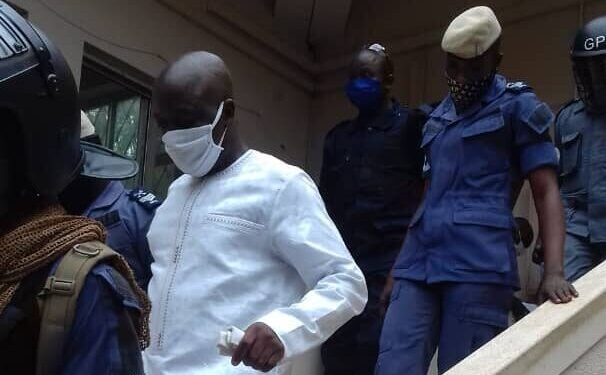By Rohey Jadama
Former minister Yankuba Touray has been allowed to testify in a case in which he has been charged with the murder of a former Cabinet colleague.
High Court Judge Ebrima Jaiteh dismissed the prosecution’s objections that Touray had foregone his chance to speak in court when he allowed his lawyers to call witnesses first, saying that all persons being tried for a criminal offence must be given the full opportunity to defend themselves before a court of law in person, present their case, and call witnesses.
He added that a failure on the part of the court would be a breach of natural justice and the rights of the accused.
“From the foregoing reasons and in the interest of fair hearing and natural justice, the accused should be allowed to testify and the weight to be attached to his evidence shall be determined at the end of this trial. Accordingly, natural justice demands that a party must be heard before the case against him is determined,” the judge said.
Touray, a former Local Government minister, has been charged with the murder of former Finance minister Ousman Koro Ceesay, whose body was found in his burnt car in June 1995.
The prosecutors argued that allowing Touray to testify after other witnesses had already taken the stand would undermine the integrity of the evidence.
They insisted that it was mandatory for the accused to testify first before calling other defence witnesses, adding that witnesses who had yet to testify should be excluded from the court. The prosecution said the principles of law and natural justice presuppose that an accused person who desires to defend himself would be eager to testify first.
The lawyers described Touray’s application to be allowed to testify at this point in the trial as highly prejudicial to the case because he had listened to the cross-examination of the first and second defence witnesses – his wife and her sister.
“An assumption must be held that any evidence offered by the accused person at this point would be tainted as a result of first-hand perception of cross-examination of Defence Witness 1 and Defence Witness 2.”
But Touray’s lawyers argued that what was important was the relevance of evidence and not the weight the court would attach to it as this would be determined at the end of the trial.
They insisted that the right to be heard overrides the Criminal Procedure Code (CPC) and that the right to speak is absolute. They asked the judge to allow Touray to testify in the interest of justice, and also to give the prosecution the opportunity to cross-examine him.
Justice Jaiteh ruled: “Upon careful perusal of section 240(4) of the CPC and to ascertain what is the sanction that has been provided if the accused did not testify first in his defence and in my humble opinion there is no sanction created if the accused failed to testify before calling other witnesses in his defence. In short, there is no legal effect created in section 240 (4) of the CPC if the accused failed to testify before calling other witnesses. Therefore, section 240(4) of the CPC in my view is merely directory and not mandatory and if the legislature had intended to make it mandatory, there would be a sanction for breaching section 240(4) of the CPC and this court, in its quest of doing substantial justice, cannot punish the accused for a breach of duty when the act is directory. I hold the strong view that the use of ‘shall’ in section 240(4) of the CPC does not connote mandatory obligation and therefore not absolute.”
The hearing was adjourned to the following day, August 25, 2020, at 10 am.







